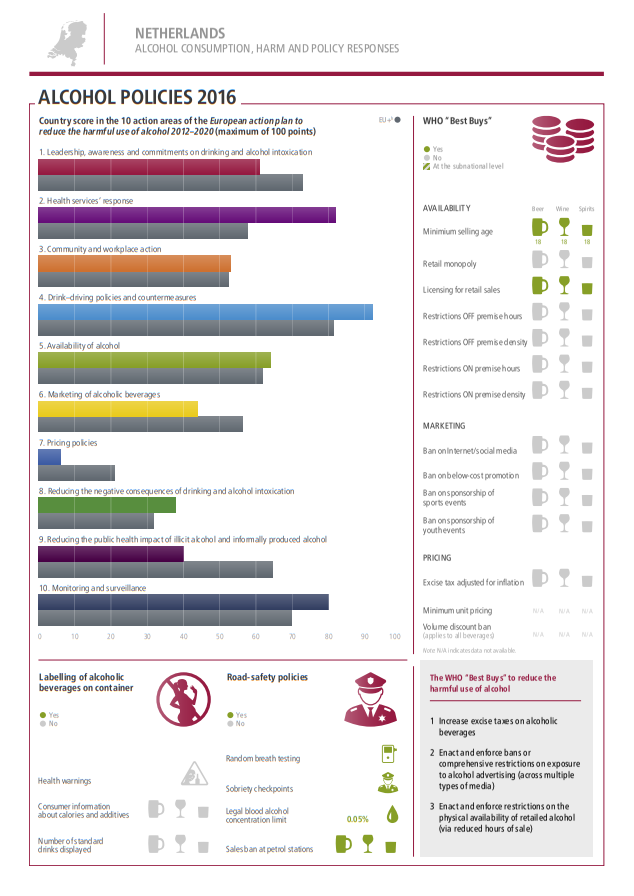The Trimbos Institute, on behalf of the Ministry of Health, Welfare and Sport, researched the question “What do the Dutch know about the personal and social harm of alcohol consumption?”
Here is a summary of the key facts of what they found:
- Few Dutch people know that alcohol increases the risk for various cancers and dementia. Alcohol’s link to breast cancer was known only by 18% respondents.
- Many people think they know the advice from the Health Council on alcohol use, but 33% wrongly believe that the advice is to consume a maximum two glasses of alcohol a day. The actual advice is to avoid consuming any alcohol at all and if consuming no more than one glass a day.
- 58% of respondents believe a wine bottle only contains six standards units of alcohol when it actually contains 7.5 standard units of alcohol.
- Respondents largely underestimate the social consequences of alcohol use.
- Only 24% of the respondents knew that alcohol use by men prior to conception can increase the risk of miscarriage in a pregnancy.
The report highlights that those who consume alcohol heavily know less about the personal and social consequences of alcohol consumption than the average.
The report found that in this group:
- Over a quarter wrongly believe consuming two glasses of red wine a day is healthy.
- 39% wrongly believe the Health Council recommends consuming maximum two glasses of alcohol a day, compared to 29% among lower risk alcohol users.
- This group is less aware that children who see parents consuming alcohol form positive ideas about alcohol. Only 66% of heavy alcohol users know this compared to 77% of lower-risk alcohol users.
Alcohol harm in the Netherlands
Alcohol harm in the Netherlands is pervasive.
WHO Europe data show that in the Netherlands alcohol causes the following harms:
- At least 2900 people get cancer every year due to alcohol use.
- Approximately 29,000 people are seen each year in addiction care services due to alcohol problems.
- Among adolescents and young adults (15-24 years old) who have died prematurely, alcohol played a role in those deaths in 1 in 7 cases.
Despite the heavy alcohol burden in the country, alcohol policy remains weak in the Netherlands.
The WHO Europe fact sheet on the Netherlands released in 2018 shows that the country can improve alcohol policy in many areas. These include:
- Availability restrictions on off-premise and on-premise alcohol sales hours and outlet density,
- Alcohol marketing bans on social media, promotions and sponsorships, and
- Pricing policies such as by adjusting the alcohol excise tax to inflation or a minimum unit price.
The Dutch Ministry of Finance has recognized that alcohol policy solutions can improve Dutch quality of life while saving healthcare costs to the country.
As Movendi International reported Dutch Minister of Finance Wopke Hoekstra has sent 16 Broad Social Review reports to the House of Representatives. These advisory reports from top officials are prepared in advance of the next cabinet formation in 2021. The report on controlling healthcare costs lists 40 policy options and many preventive measures, including five alcohol policy measures.
Sources
DutchNews.nl: “Misconceptions about alcohol are widespread, addiction clinic says“
Trimbos Institute: “Harm from alcohol consumption underestimated“
